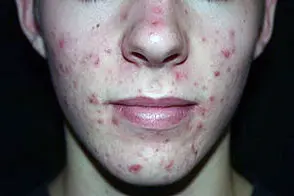 It’s better to consult a skincare professional about treating acne.
It’s better to consult a skincare professional about treating acne.Ah, the beautiful time of youth! You find yourself stopping in front of the mirror more often, gazing intently at your reflection—rosy cheeks, luscious hair…
But wait, what’s that? Little black spots on your nose, forehead, and chin. Where did they come from?
Acne often makes its appearance during this time, which is why it’s commonly referred to as “teenage acne.”
Typically, it occurs in individuals with overactive sebaceous glands and a changed chemical composition of their skin oil. For those affected, the skin appears porous, shiny, and reminiscent of orange peel. The oil produced by the glands gets trapped in the ducts, and dust and dirt that enter lead to the formation of blackheads—known as comedones. Bacteria also invade the sebaceous glands, causing inflammation. This is how inflamed nodules, pustules, and whiteheads develop.
A significant role in the emergence of this troublesome condition is played by hormonal imbalances, as well as stomach and intestinal disorders, excessive consumption of fats and carbohydrates, and improper skincare routines.
Some believe that teenage acne will eventually fade away on its own. And indeed, as the years pass, the acne may disappear, but scars and dark spots can remain on the face. This is why it’s crucial to treat the skin as early as possible, starting with addressing any underlying health issues that accompany the acne.
Initially, vitamins are recommended, particularly vitamin A, which regulates the activity of the sebaceous glands. It’s also important to limit the intake of fats, carbohydrates, and extractive substances. This means saying goodbye to rich soups, candies, and pastries.
Fresh air walks and sports activities are beneficial as well. It’s better to consult a skincare professional about treating acne.
So, how should you care for your skin during and after treatment?
Cleanse it with hot water and soap. However, prolonged use of hot water can lead to the dilation of blood vessels and premature sagging of the skin, so it’s essential to rinse your face with cold water, adding a tablespoon of vinegar, lemon juice, or citric acid.
If your skin is porous, you can wipe your face (in circular motions along the massage lines) with a soapy cotton pad sprinkled with table salt. Leave the soapy foam on for 5 to 8 minutes, rinse with hot water, and then splash with cool water.
If your skin is shiny, you can wipe it with calendula tincture, 3% boric alcohol, or lotions containing pore-tightening and skin-disinfecting ingredients that help prevent acne.
Masks that dry out the skin are also beneficial.
Once the acne clears up, in addition to the recommended treatments, we advise getting a facial at a skincare clinic at least once every 2 to 3 months, and during the fall and winter, exposing your skin to a mercury-quartz lamp.
Acne is a common condition, and it should be treated under the supervision of a dermatologist or skincare professional.
